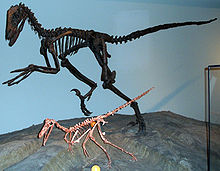Buitreraptor
Appearance
| Buitreraptor Temporal range: Late Cretaceous,
~ | |
|---|---|

| |
| Reconstructed skeleton of the holotype MPCA 245 at the Carlos Ameghino Provincial Museum | |
| Scientific classification | |
| Domain: | Eukaryota |
| Kingdom: | Animalia |
| Phylum: | Chordata |
| Clade: | Dinosauria |
| Clade: | Saurischia |
| Clade: | Theropoda |
| Family: | †Unenlagiidae |
| Subfamily: | †Unenlagiinae |
| Genus: | †Buitreraptor Makovicky et al. 2005 |
| Type species | |
| †Buitreraptor gonzalezorum Makovicky et al. 2005
| |

Buitreraptor is a small dromaeosaur from the Cretaceous of Argentina. It was about four to five feet long (1.5 metres).[1]
Buitreraptor has a slender, flat, extremely elongated snout. Its jaws have many small teeth which lack meat-tearing serrations or cutting edges. They are grooved, strongly recurved and flattened.[2] This probably meant it ate quite small animals, like lizards and mammals.
Since its close relatives had feathers, it is likely that Buitreraptor also was feathered.
References
[change | change source]- ↑ Paul G.S. 2010. The Princeton field guide to dinosaurs. Princeton University Press, 139.
- ↑ Gianechini F.A.; Makovicky P.J; Apesteguía S. (2011). "The teeth of the unenlagiine theropod Buitreraptor from the Cretaceous of Patagonia, Argentina, and the unusual dentition of the Gondwanan dromaeosaurids". Acta Palaeontologica Polonica. 56 (2): 279–290. doi:10.4202/app.2009.0127. S2CID 62811731.
